Freelance Digital Marketing - The Ultimate Guide
Chapter 1:
How To Choose Your Digital Marketing Niche As A Freelancer

In this chapter of the Freelance Digital Marketing Ultimate Guide you’re going to learn how to choose your digital marketing niche — the right way.
Getting this right early on in your career can save you a ton of trouble down the road and position you as the “go to” in your industry or specialty.
Have you heard the term “jack of all trades, master of none?”
Generalists (the jack of all trades) are valuable professionals with a range of skill sets and experiences, but typically command lower prices.
Specialists (experts in a specific skill or niche), on the other hand, are able to charge higher rates because they’re in demand and and much more rare.
We’ll show you in this chapter exactly how to start freelancing with no experience, how to pick digital marketing niches for you, and why you should do this early on in your career.
In case you’re new to this guide on how to become a freelance digital marketer, there are 6 main chapters in plus the introduction:
Are you new to this guide? If so, here’s a quick overview of all the chapters in this Ultimate Guide To Freelance Digital Marketing:
Freelance Digital Marketing - The Ultimate Guide (Overview)
- How To Choose Your Niche As A Freelance Digital Marketer
- Pricing Strategy - How To Price Your Freelance Marketing Business
- Client Acquisition - How To Get Freelance Marketing Clients
- Operations - How To Manage Your Freelance Marketing Business Like A Pro
- Client Retention - How To Keep Your Clients Happy
- Scaling - How To Grow Your Freelance Marketing Business
Let’s start by exploring how most people get started freelancing when they’re considering online marketing jobs and how you can avoid the trap of becoming a generalist with a little bit of forethought and strategy.
Getting Started Freelancing — What To Avoid
How do most people actually get started freelancing?
Typically people fall into it almost by accident.
There’s a million ways it can happen, but it might look like this:
Someone offers you money to do some ‘digital marketing’ side work for them because they know you’re good at writing, or social media, etc.
And if a client offers you money to do ‘digital marketing’ for them... why on earth would you say no?
Pretty soon that snowballs into other gigs and now you’re billing yourself as a “social media consultant.”
Your clients are referring new clients and it’s starting to take off. Sweet!
That starts to turn into other types of work and before you know it you’re doing freelance advertising, copywriting, blogging, creating websites, and...
...you’re pulling your hair out trying to learn a million things and get results across a million channels.
But you say, “YES” to all the extra work, anyways.
I mean, isn’t the whole point of being a digital marketing freelancer to have people pay you for digital marketing services?

Source: Giphy.com
Actually, it turns out that saying yes to these kinds of requests can put your freelance business at an instant handicap and put you at risk down the road for being labeled a “generalist.”
It’s better to choose one service for one digital marketing niche to not only ensure your business runs smoothly, but to help you reach the top of your craft and to help you scale down the road.
Here’s why...
The Benefits of Specializing Your Digital Marketing Niche
When you are craving really good sushi - a place that's fresh, traditional, made by true masters of this intricate Japanese craft… what are the chances you’re going to choose this restaurant?:

Not very high.
Now imagine - you’re a dentist looking for someone to manage your social media accounts. Are you more likely to go with this guy…

Job description for freelance graphic design.
Who seems to dip his toes into just about every digital space he can think off...
Or this guy…

Social Media Marketing Consultant
"Hello, I am Dentistry student on my final year, with interest in Digital Marketing. I am interested in developing SMM strategies for Dental Clinics. I can create very creative and authentic posts, related to target audience and goals we want to achieve."
Social media marketing consultant proposal
A Social Media Marketer who is an expert in the dental niche?
“Well, when you put it that way!”
Becoming THE provider for very specific digital marketing services in a very specific niche puts you ahead of the competition, makes you an authority in that area and allows you to charge more.
By having a clear marketing niche and specialty, you’ll be able to:
Differences Between Agencies and Freelancers
Why provide just one particular freelance service instead of a full range of solutions for one specific niche? For example, why avoid becoming a full-service-digital-marketer for dentists?
While this is an enticing idea early on as a freelancer, and definitely something of value to that niche - being a freelancer (by definition) means you’re delivering services as just one person.
The time it takes you to stay on top of all the different marketing strategies, trends, and platforms is not something that one person can accomplish at an expert level on their own.
At best, you would only be able to dabble in each arena - never having time to dig in deep enough to get great results.
But there are companies out there that offer this all in one marketing package.
They’re called Digital Marketing Agencies and here’s how they work.
What is a digital marketing agency?
A Digital Marketing Agency is a company that offers a range of digital marketing services and project management for digital marketing campaigns. These agencies house a team of experts in individual fields, working together to provide a solution for their clients.
Agencies are typically a collection of specialists and generalists with someone at the top organizing client campaigns and providing account management. Specialists in a range of areas are brought in to provide a more holistic service for the client.
The team is usually employed by the agency or are freelancers working on a contract basis.
The main thing to remember here is that even though it may look like these agencies do a bit of everything, they employ a dedicated expert for each marketing specialty.
So as a freelancer, take a leaf out of the expert's book and make sure that you stick to one specialty for yourself!
Types of Digital Marketing: How to Choose Your Speciality
Let’s do a little experiment together. Type: “How many types of digital marketing are there?” into Google.
Go on… I dare ya!
Well, how many did you find?
Yep, ‘7’, ‘10’, ‘9’, ‘21’... It’s safe to say there are no universally defined classifications. There are endless variations of digital marketing that fall under different hats.
There are at least 7 primary types (Search Engine Optimization (SEO), Search Engine Marketing (SEM), Pay-Per-Click Advertising (PPC), Content Marketing, Social Media Marketing (SMM), Affiliate Marketing, and Email Marketing) — and there’s even more specialties depending who you ask..
Now pair them each with:
- An industry
- A strategy
- And a specific role
There are endless combinations to find your digital marketing niches (the cross-section of expertise and strategies that you choose to focus on).
So with all those potential options, how on Earth do you decide what to specialize in?

Source: Giphy.com
Don’t worry, before you go having an intergalactic-sized quandary... as promised - we’ve put together a foolproof step-by-step guide to help you choose.
Just follow the exercises below and before you know it, you’ll be a [x role] specializing in [x strategy] for [x niche]. Woohoo!
1. Choose the Niche You Want to Serve

Most other blogs and guides out there will tell you to start by choosing the skillset you want to learn.
In this guide, however, we are taking a much more practical approach that will help you align with clients you enjoy serving most.
By carefully selecting the industry/niche you want to work with first, you can curate who you do business with and spend your days serving an area you’re actually passionate about.
Your niche also dictates what sort of prices you can charge for your services.
For example, a lawyer can pay a lot more for a Google Adwords campaign than a hairdresser can - so your choice on which industry to serve has a close correlation to how much you can earn as a freelancer.
Here are some important considerations when choosing the niche you want to serve:
- Passion - What are you obsessed with? What do you already know all the terms for, the culture, the issues? What do you find yourself spending hours looking up when you have free time for yourself?
- Positioning - Do you want to work on high ticket projects providing high-quality services, or do you want to be down in the trenches helping the little guys - eg. helping Suzie get her jewelry brand more views or helping startups in the share-economy niche get their first few customers.
- Demand - Do you see massive growth or opportunity in a particular niche?
- Experience - Do you already have a marketing skill set that is highly sought after by a particular industry or type of business?
Now it’s time to get specific. If you’ve just chosen a general industry or broad market (eg. dance) - you’ll need to niche down.
If you’re reading this guide with sleepy eyes because you were up until 2am last night watching dance videos on Instagram - you probably figured ‘dance’ might be good niche to specialize in.
But “dance” is incredibly broad. It’s time to choose a niche market within that category.
Do you want to help dancers? Studio owners? Dancewear brands?
Also, keep in mind how you’re trying to position yourself here. Budding dancers aren’t going to have the cash for a six-figure viral marketing campaign, but perhaps a well known dance studio might.
2. Niche Research - Find Your Niche’s Pain Points

Once you have chosen your niche, clearly identify the problems, pain points, and opportunities within that niche.
Doing this is going to help you:
- Craft an irresistible offer.
- Gain clarity on your customer avatar.
- Market your services easier: you need to know where your audience is hanging out, exactly what they’re struggling with and capture all the actual words they use to describe their problem (which is great for your sales copy later on).
Go broad in your brainstorming at first - noting down all the major problems that niche is facing - but take special note of those problems that can be fixed by some form of marketing.
Here’s how to dive into niche research in a methodical way:
Step 1: Prepare
Set aside 3 hours to do a stint of intense niche research. Create a Google Document or Excel sheet named ‘[x] Niche Notes’ with a second tab named ‘Audience Words’. The first will be for your notes, the latter for copy/pasting the exact wording your target audience are using to describe their problems and pain points.

Freelancer competitive research spreadsheet template.
Step 2: Infiltrate
Join all the groups and communities that you can find revolving around your digital marketing niche. Focus on networks that your ideal customer goes to for peer-to-peer advice.
Once you’ve been accepted into these groups, use the native search function or just browse to find common problems or pain points.
Fill out both your ‘[x] Niche Notes’ and ‘Audience Words’ Google docs as you’re looking at the results, including the exact wording used in comments and questions.
Try to find patterns. You are looking for the most common and recurring issues your niche has.
You can go even deeper by sending private messages to those who have written about a certain pain point. Within these communities - as long as you are not salesy (jumping straight to trying to sell them an offer) - members are usually quite generous with their time and information.
Places to find these communities include:
Do a search for your niche in the Groups tab of the Facebook search function. If the results are too generic, try adding terms such as ‘mastermind’, ‘community’, ‘network’ etc to the search.
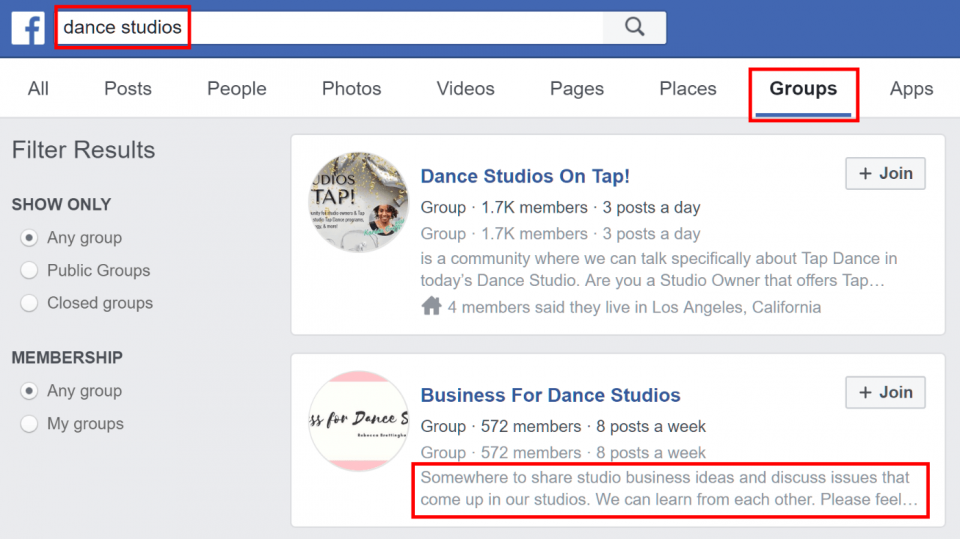
FB Group Search - Searching for audience pain points
Use LinkedIn’s group search to find groups for your marketing niche. Keep in mind that most LinkedIn groups are pretty spammy, but you may find a few good ones.

How to use LinkedIn groups to find your niche.
Use google to find membership sites, communities attached to courses (for example, the ‘dance business management’ course + community), industry networks and various other goldmines of audience information.

Type your niche into Google and add terms like ‘course’, ‘mastermind’, ‘community’ and ‘network’.
Google will automatically return results relevant to your location, so to make your search broader, follow these steps:
- Turn on your VPN and choose a central location such as the USA
- Open an incognito window in your browser
- Use Google.com/ncr to search for your above terms
NOTE: NCR stands for “no country redirect”. Using the above URL means Google will search from whichever country your VPN is set to, rather than the country you’re currently residing in.
Step 3: Direct Search
A less hands-on but equally beneficial way to discover these pain points is to do direct online searches.
You can search Google, Quora, Reddit and Authority Sites within your digital marketing niche to find questions that are commonly asked.
Let’s briefly go through how to do this on each of these options.
To uncover target market pain points in Google:
Go to Google, and search for something like “how to + your target market.”
From there you’ll be shown common questions surrounding that niche.
Here’s an example:

Target market research in Google
Go a step further by clicking on top articles for those questions and reading the comments on each blog post. This will give you a direct line to real-world audience questions.
Depending on your niche, Reddit and related Subreddits can be incredibly useful for niche research. You can tap directly into the questions that the audience is asking.
Go to Reddit and search for your niche. In the search results, click the ‘Community and Users’ tab to check if there are any relevant subreddits in your niche.
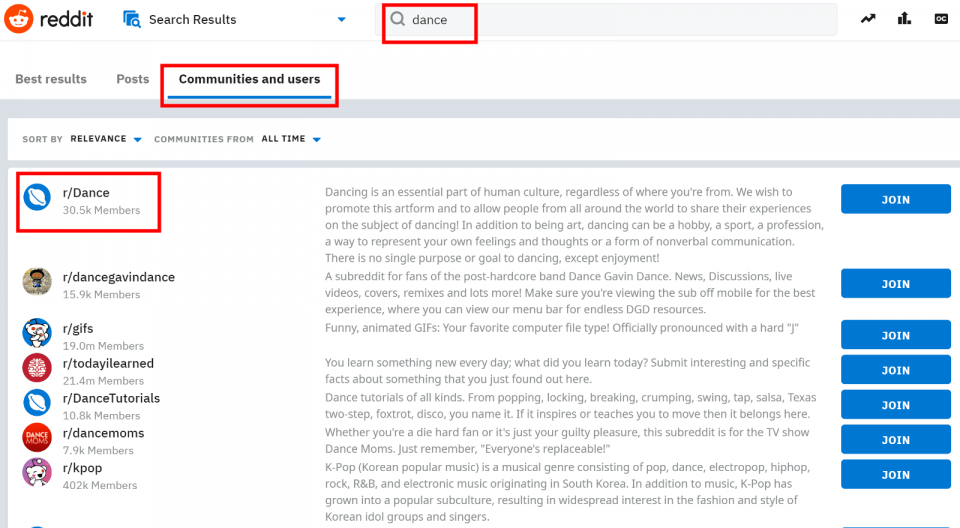
Target market research in Reddit
From here you can search within the subreddit or just browse the subreddit for common questions.
Quora
Quora is a gold mine for finding pain points because it only deals in questions.
In other words, professionals are going to Quora every day to solve their big industry-related problems by asking questions of other pros.
There are a million and one ways to search on Quora, but a great strategy for finding relevant questions is to type your niche into the search bar and hit enter. Do not select a topic, just search the term.
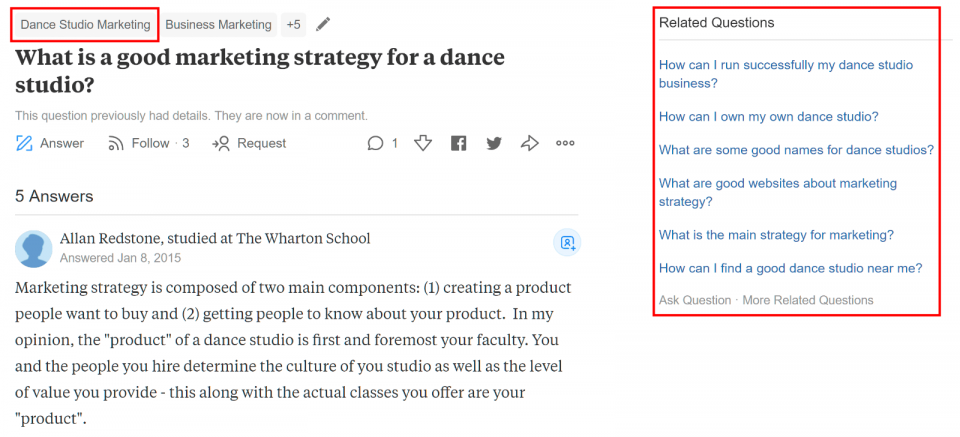
Find your market on Quora
Click on the most relevant question.
From here Quora’s very handy algorithm will show you relevant related tags and questions.

Find your market on Quora
Go on a Quora expedition, browsing the relevant tags and questions. It’s also useful to look at the answers being given to get an idea of the information and current solutions floating around in the industry.
Note down on your spreadsheet the most common pain points people are having.
3. Figure Out How You Want to Solve Your Marketing Niche Pain Point

Choose just one major paint point to solve!
Remember, you are a freelancer, you don’t need to fix all your niche’s problems.
You are just one person, and to provide your solution effectively, you need to focus on solving just one problem and delivering that solution exceptionally well.
So how do you decide which pain point to address and then solve it in an effective way?
Here’s how you can find a match between your skills, a pain point and a possible solution:
1. Write down all the common pain points you found, leading with those that have the most opportunity (a.k.a. those yet to have a good solution available or those that have an abundance of solutions available proving that it’s a lucrative market).
2. Write down the possible solutions to each pain point. Get to the heart of each problem, identify the real issue and the contributing factors and side issues.
Here’s an example of a pain point analysis which you can work into your spreadsheet:
Niche: WordPress Plugin Companies.
Pain Point: Because WordPress plugins have such a low price point, there’s often not enough budget to market the plugin effectively. This results in the plugin not getting any traction, making it hard to cover the initial cost of production.
Real Problem(s): Not enough traffic, low budget.
Solution Requires: A low cost way of getting a lot of traffic.
Possible Solutions:
- Content marketing campaign
- Product Hunt listing optimization
- Paid ads on the more affordable platforms, such as Reddit or Quora
- Organic social campaign
- Viral campaign
- Creating a Podcast
- Guest blogging
- Affiliate campaign
Once you have a list of possible solutions, it’s time to choose which of those solutions you’d like to offer.
Use these considerations to help you make your final decision:
Workshop each possible solution until you come up with one offering.
In our example above, your solution could be ‘Podcast production for WordPress based companies’ or ‘Content marketing campaigns for WordPress plugin developers’.
4. Test Interest In Your Solution

Once you have decided on a solution, it’s time to test the offering to make sure it’s something your niche values.
There are two ways to quickly test if your solution is a viable one:
1. Try to find businesses already providing the solution you’ve decided on - to the same niche you want to serve. In other words, look for direct competitors. The more you find, the better. It means there’s demand for that service. If nothing comes up, there may be a reason why no one has successfully ventured into that niche/solution combo.
2. Talk directly to your potential customers. If you’ve been following the steps in this post, you should have already been in contact with a few of them. If not, head back to the Facebook Groups and forums serving your niche and private message a few people experiencing the pain point you are solving.
Make it clear you are not selling anything, just validating an idea.
If you can get people on a call, great, otherwise just chat through a private message.
Run your solution by them to get their opinion on whether it sounds like something they’d invest in or have any objections or concerns about.
If you’re getting an overwhelmingly positive response, you’re on to something.
Now it’s time to analyze competitors in your niche.
Competitive Analysis
By now you’ve identified a niche and validated market demand with businesses in your chosen niche market.
Now it’s time to really dig deep into competitor offerings already out there so you can figure out where you fit into that landscape and how you can differentiate yourself from other service providers targeting the same niche.
Let’s go back to the spreadsheet and open up a new tab. Let’s call it “Competitive Landscape.”
You’re going to create a new header on the tab, with these headings in the first row:
- Competitor
- Website
- Services
- Costs
Like so:
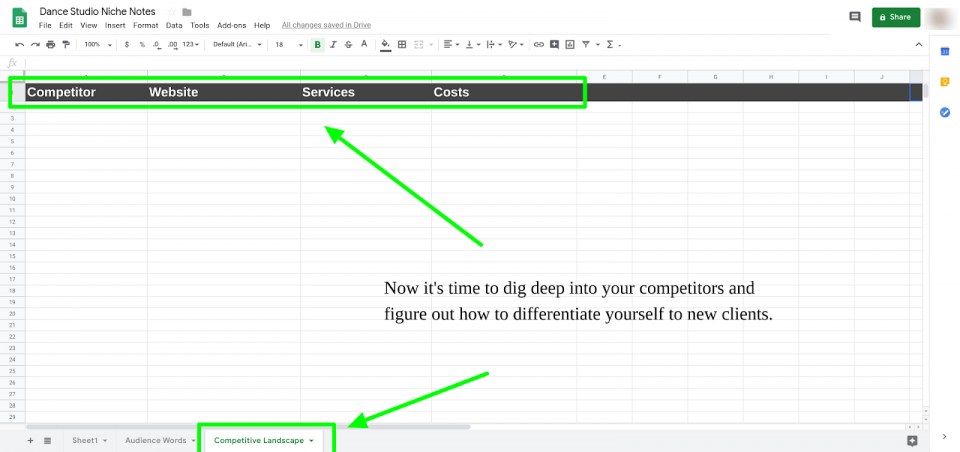
Niche research for your freelance business.
Use Google and your communities to see if solutions exist for the pain points you identified and if there’s room for competition, an opportunity to improve or an entirely new solution to a common pain point.
You can search for phrases like:
- “Lead Generation For Dance Studios”
- "Social Media Services For Dance Studios”
What solutions are there for the pain points you have identified? Are they working? Is there still something lacking? Or better yet, have you identified any big areas of opportunity where there’s a glaring pain point, but no obvious solution?
If you see competitors with rave reviews in Google and awesome testimonials that are clearly not faked on their website or landing page, you know you’re looking at a quality provider.
On your spreadsheet fill out at least 5 - 10 rows with the top performing expert freelancers and service providers (even agencies if you want), then list out their services and costs.
After that, it’s time to do some deep soul searching...
How can you position yourself against these already established players and carve out a piece of your niche market?
Is there a clearly identifiable “hole” in your niche with high demand and low competition?
Or is there a way for you to deliver the same services as others, but provide better results?
Becoming an Expert in Your Marketing Niche

You’ve chosen and validated your offer and you’ve done the market research and are feeling confident about your niche. Now what?
First you’ll have to hone your skills in the chosen area of expertise.
Once you have chosen your solution - it’s time to become an expert.
Identifying valuable and verified sources of information will save you a lot of time and energy, as will going about your learning in a systematized way. No casual YouTube video here, speculative blog post there.
There are two main ways you can buildup your knowledge and experience.
Learning Through an Apprenticeship Or Mentorship
If the field you’ve chosen is complex and currently outside your area of expertise, it’s best to undertake direct training from people who are already successfully doing what you want to specialize in.
With this method you’ll either offer to work for free in exchange for training, offer some kind of value exchange for training (maybe you have a complementary skill you can teach in exchange) or you can simply work for the business and learn on the job.
Keep in mind the training you’re trying to get only has to be skill-specific, not niche-specific - meaning if you’ve chosen to do Facebook Ads for dog trainers, you’ll need to seek out a Facebook Ads expert for local businesses, but that mentor doesn’t have to specialize in the Dog Trainer space. It’s actually better if they aren’t focused on your target niche as it’s best not to get trained up by someone who will then become your direct competition.
Here are some ways you can find an appropriate trainer:
- Search in Google - eg. ‘Facebook Ads specialist for local businesses.’
- Find existing networks for the service you want to offer eg. a Facebook mastermind group for Facebook Ad specialists.
- Look for service providers in online directories.
- Look up official apprenticeships on job sites like angel.co
(Note: With this method there is usually an expectation you will work for the company after the apprenticeship. Be very clear on your intentions. You can even offer to work with them for a minimum period after training - say 6 months - so that both parties benefit from the deal.)
Once you have found a few possible mentors, get in contact with them and make your proposal.
Obviously free work for practical training is a lot easier for a mentor to agree to - so keep that in mind when preparing your apprenticeship pitch.
But even if you are offering free work, it’s still a lot of effort and hassle for someone to take you on as an apprentice - so make sure that you focus on what tangible benefits your mentor will get from the deal in your pitch.
You can sweeten the deal by mentioning all your relevant skills or complementary expertise that the mentor will benefit from while you’re there.
Give a definite time frame you’ll be available to them so they know they can rely on you as an employee for a set period of time. Try and make the apprenticeship a win-win for everyone.
Learning Through Practical Experience
If your specialty isn’t too complex, you can start taking customers immediately and learn as you go.
By actively executing your service - looking up questions and addressing problems as they arise - you’re ensuring you get real world and practical experience. This is a far better alternative than getting lost in online course-ville, preparing to prepare and never implementing theoretical lessons into real life action.
Since you’re not quite an expert yet, we advise you not to charge your ‘tester’ clients “full price”.
Be honest and let your clients know that you’re just starting out. Take them on as ‘testimonial clients’ - they get free or discounted work in exchange for a testimonial or case study.
Case Studies are incredibly powerful, and can be the foundation of your marketing strategy.
This method of learning works best when coupled with the next method: learning through courses. This way you get to learn the theory, and then immediately implement it in a practical sense with real clients.
Learning Through Courses
There are a TON of courses out there - on just about every topic under the sun.
Unfortunately it’s hard to know which courses deliver real value.
There’s so many courses offering such a wide range of learning, it can be hard to figure out which will actually deliver value and prepare you for a freelance career.
To sort the wheat from the chaff, we recommend you take advice from the everyday people working in your industry. Not influencers, not blogs, just good ol’ Joe Blow working the 9-5 running his SEO agency.
To find these humble heroes, join the major Facebook groups and forums for your industry - e.g. Facebook Ad Manager support groups.
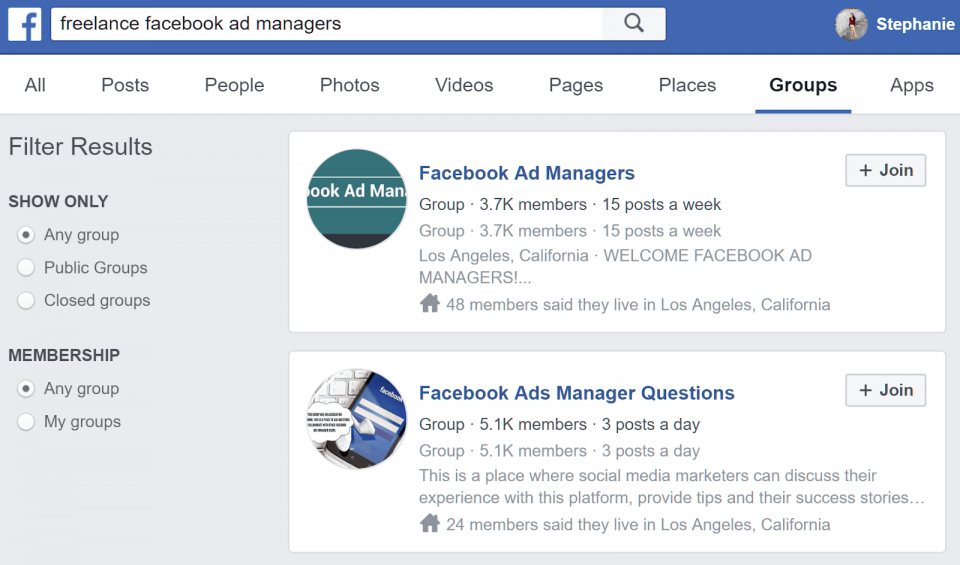
Finding experts with Facebook Groups.
Either search within the group to find the most recommended training programs, or post in the groups asking for recommendations.
Congratulations on choosing your target service and freelance digital marketing niche!
That was a huge accomplishment, and now it’s time to figure out the next big piece of the puzzle.
Congratulations On Your Digital Marketing Niche
Now you have a niche, a specialty, and you are on the path to gain some expertise.
If you’re lucky, you’ll already have a few leads from the research and learning stages. If you don’t, no worries, we have an entire chapter dedicated to finding new clients for your service.
Before you find clients however, you'll need to know what to charge them. So next up is a chapter on how to price your services.
We’re going to show you:
Pricing can be tricky for even the most experienced freelancers.
After reading Chapter 2, you'll have a comprehensive framework for establishing your freelance pricing.
Share this ultimate guide on your social media account with the buttons above
Next: Pricing Your Freelance Services
Disclaimer: Nothing on this page, our website, or any of our content or courses is a promise or guarantee of results. All the material within ThriveThemes.com is provided for information purposes only and we are not implying you'll duplicate any results. Your results will vary and depend on many factors. All business entails risk and no action should be taken solely based on the information in ThriveThemes.com. The publisher is not entering into any kind of practitioner/client relationship with its readers. The publisher is not responsible for errors or omissions.
This site is not a part of the Facebook website or Facebook Inc. Additionally, This site is NOT endorsed by Facebook in any way. FACEBOOK is a trademark of FACEBOOK, Inc.
Copyright 2019 by whitesquare GmbH, Thrive Themes | Contact | Privacy | Disclaimer